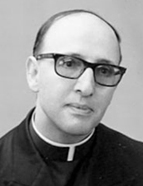

His first article, published in 1940, "A poesia modernista de Orpheu a Altitude (Modernist poetry from Orpheu [journal] to Altitude [journal]), focused on controversial authors such as Mário de Sá Carneiro, Fernando Pessoa, Teixeira de Pascoaes, and José Régio. From 1963, he began to make extensive use of pseudonyms, taking a total of 124 different names in the 410 identified articles. This strategy enabled him to "conceal himself from the public eye" while at the same time granting the journal "the aura of having a broad range of contributors". For a period of almost fifty years he broached topics as diverse as theology, philosophy, aesthetics, politics, international relations, education, and literary criticism. (Biografia… [Biography…], 2011, pp. 103-105; 243-270).
Manuel Antunes also collaborated in other academic periodicals. Between 1963 and 1980, he participated in the redaction of twenty volumes of the Enciclopédia Verbo Luso-Brasileira de Cultura [Luso-Brazilian Verbo Encyclopaedia of Culture] (23 vols., 1963-1995). He wrote around two hundred and fifty entries on a variety of subjects ranging from theology, philosophy, politics, literature, and classical culture. He also published extensively in the Revista Portuguesa de Filosofia [Portuguese Journal of Philosophy] (Braga) from 1950 to 1958, resumed later in 1982, in the Revista da Faculdade de Letras de Lisboa [Journal of the Lisbon Faculty of Arts] (1963), and in the journal Euphrosyne of the Centro de Estudos Clássicos [Centre for Classical Studies] of the same institution (1959-1967) (Idem, pp. 271-280, 327-336).
In 1960, he launched his debut publication Ao encontro da palavra: ensaio de crítica literária [Towards an encounter with the word: literary criticism essay] (Livraria Moraes [Moraes Bookstore and Publishing House]), a collection of articles on philosophy, literature, and the sociology of culture. With a philosophical and theological slant, in the same year he published Do espírito e do tempo [On spirit and time] (Ática Publishing House). In a separata of Brotéria, O mundo de hoje e a religião [Today’s world and religion] (1964) and Função da teologia no mundo de hoje [The role of theology in today’s world] were disseminated (1967, under the pseudonym Carlos Outeiro Cruz). From the 1970s onwards, his monographs focused on current political, educational, and literary topics. Thus, in 1972, Indicadores de civilização [Indicators of Civilization] (Editorial Verbo [Verbo Publishing House]), Educação e sociedade [Education and Society] (Editora Sampedro [Sampedro Publishing House]), and Grandes derivas da história contemporânea [Major drifts of contemporary history] (Edições Brotéria [Brotéria Publishing House]) were published; the following year, Grandes contemporâneos [Great Contemporary Figures] (Editorial Verbo);
